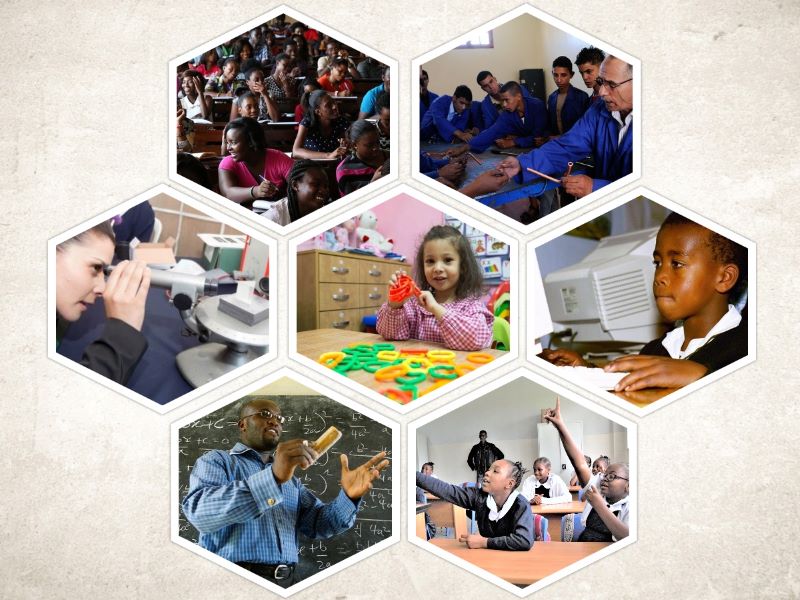 Lifelong Learning should be seen as Schooling for All.
Lifelong Learning should be seen as Schooling for All.
There are more people in school today than at any time in human history. This is an obvious fact. At the same time, we need lifelong learning opportunities. This is because learning throughout one’s life has become a necessity. That's not just for learning’s sake, but for economic needs as well. In today’s labor market, people need to learn how to learn; to re-learn; unlearn; and learn again.
We have been living through nothing short of a 'Schooling Revolution'. Education has long been considered one of the most powerful instruments for reducing poverty and inequality, and for laying the basis for sustained economic growth. More and better schooling investments raise national income growth rates. Perhaps this is way we see global average schooling levels increase. In 1950, the average person has six years of schooling in high-income countries; it is more than 10 years today. It was less than two years in Africa in 1950; it is more than five today. East Asia went from two to seven years between 1950 and 2010: more than a 200% increase. Globally, in 1900, the average person had less than two years of schooling; just two years by 1950; but more than seven by 2000. It is projected to raise to 10 worldwide by 2050. This is a more than five-fold increase in a century and a half.
Education: The Great Equalizer?
Education is the great equalizer, wrote the American educational reformer, Horace Mann in 1848. As we receive more schooling, opportunities improve and access to well-paying jobs increase. Our earnings rise and earnings differentials fall. In this way, education contributes to equality. Throughout the 20th century, education raised earnings and equalized opportunities.
In the 21st century, educational expansion is contributing to income inequality. Higher levels of education throughout the world, an unprecedented educational expansion, especially for higher education, are contributing to earnings inequality. The differences in earnings between more and less educated are rising. Demand for skills is outpacing supply, thus maintaining the earnings advantage of the highly educated.
Technology
One reason why educational expansion is coinciding with rising inequality might be due to technological development. Technology, automation and artificial intelligence all raise the demand for schooling. But technology also makes certain skills obsolete, while putting a premium on other skills and raises the overall demand for skills. This is leading to a race between education and technology, a concept first introduced by Nobel Prize winning Dutch economist, Jan Tinbergen.
If automation implies a race between education and technology, then who is winning? In most of the 20th century education was clearly winning. But today, the ability of workers to compete is handicapped by the poor performance of education systems in most countries. At the same time, there is demand: The returns to schooling are high in most developing countries, and growing skill premiums are evident in much of the world.
What can be done
Our school systems are not keeping up. Neither in terms of numbers nor in quality. More schooling is necessary, but at high levels, and with higher levels of quality – in terms of what students actually learn and can do. But new skills are needed, too.
The three biggest policy priorities that governments, investors and the development community should be doing to prepare for the future include:
- Focus on basic skills, early development, and measure and improve early reading – as well as teacher development, appropriate learning environment, modern education management system
- Give opportunities to workers to invest in relevant skills for labor market that make them benefit from, and remain immune to, automation – and allow them to re-invest, re-skill, throughout their lifetimes
- Use evidence from labor market returns to education to implement financial innovations - and use future earnings to finance higher education
This is not easy. Even ensuring the fundamentals is difficult. In developing countries there are more than 250 million children out of school. Another 250 million are in school but cannot read. In fact, 53 percent of children in low- and middle-income countries cannot read and understand a simple story by the end of primary school. In poor countries, the level is as high as 80 percent. Therefore, step one is to focus on early reading success.
Moreover, we need to invest in relevant skills. That is, in addition to cognitive skills, we need:
- Problem-solving skills – to think critically and to analyze
- Learning skills – to acquire new knowledge
- Communication skills – including reading and writing
- Personal skills – for self-management, making sound judgments and managing risks
- Social skills – for collaboration, teamwork, management, leadership, resilience and conflict resolution
Learning – or learning to learn skills – matter a lot for building a system of lifelong learning. But how close are we?
The World Economic Forum coined the term 4th Industrial revolution. If we are moving towards 4.0, then what is the analogy to education? Are we at 1.0? Are we still in the system based on the schoolhouse and teacher? Are we at 2.0? Where we have collaboration, smart use of technology, with the teacher as facilitator? Or have we moved to 3.0? Connected, personalized, open access education? We certainly aren’t at 4.0 if that means lifelong learning driven by autonomy and purpose. Of course, some systems have some elements of higher order education and have evolved from traditional schooling; but certainly not all, and not for everyone.
Lifelong Learning should be seen as Schooling for All. It is for all, and for all time, and everywhere (ubiquitous). It has to be about quality, but beyond test scores; and towards self-realization. It is preparation for the world of work; indeed, for the uncertain world of tomorrow.
Lifelong learning is human capital.


Join the Conversation